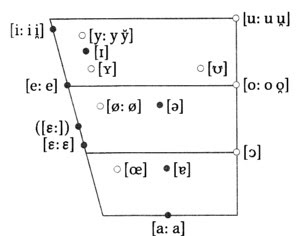uvulartrill wrote:My former teacher never corrected our [r], but that's because nobody but me cared about the pronunciation. I chatted a bit with the other teacher, she's got a near-native pronunciation and she told me she was taught at the university to pronounce a voiced uvular fricative, and to vocalize it after long vowels. Unfortunately, I didn't ask her if a voiced alveolar trill was allowed.
Interesting. To me, a uvular fricative sounds French, at least when it's at the beginning of a word. I'd use a uvular approximant there. So maybe I should have written [ʁ̞] instead of [ʁ].
In Hessian (a central German dialect), /r/ is dropped after a vowel, and /-er/ is pronounced [ɛ]. So "Sport" becomes [ʃpɔtʰ], "Mutter" becomes [ˈmʊdɛ].
I was told the German /a/ is somewhere between [a] and [ɐ], and /r/ in a sequence vowel-R-consonant is a short [ɐ]. That makes it kind of tough to transcribe /ar/ as in "hart". Is it [häɐ̯tʰ] or [hɐə̯tʰ]? I believe I pronounce both /a/ and /r/ [ɐ], though the length differs. But my /ar/ is clearly a diphthong, not a long vowel.
Talking about vowels: Many central and southern dialects don't use rounded front vowels. Examples:
- "schön" [ʃeːn]
- "früh" [fʁɪː] - [friː]
- "können" [ˈkʰɛnə] - [ˈkɛnɐ]
- "Schürze" [ʃɛɐ̯ts] - [ʃeɐ̯tsn̩]
- "Körper" [ˈkʰɛɐ̯bɐ] - [ˈkeɐ̯pɐ]
- "Häuser" [ˈhɐɪ̯zɐ]
